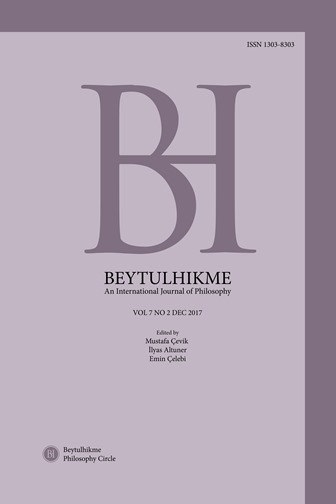Between Foucault and Agamben: An Overview of the Problem of Euthanasia in the context of Biopolitics
Author :
Abstract
Bu yazıda, ölmenin ve öldürmenin özel biçimlerinin yaşam ve ölüm arasındaki karanlık bir bölgede veyahut bulanık bir sınırda meydana geldiği gerçeğini göz önünde bulundurarak, ötenazi olgusu üzerinden, Michel Foucault (yaşam-politikası) ve Giorgio Agamben’in (ölüm-politikası) biyopolitika kavramsallaştırmaları arasında bir orta yol bulmayı deneyeceğim. Bu doğrultuda, tarihsel bir arka plan sunmanın elzem olduğuna inandığım çalışmaya, egemen iktidarın bugünkü felsefi temellerini aldığı ve teorik doğrulamalarını sağladığı mevcut hukuki-tıbbi-siyasi kompleksi anlamak için, ötenazi ve intiharın kısa bir tarihi ile başlayacak; ve iktidar ile ölüm arasındaki ilişkinin her daim oldukça sorunlu olduğunu göstereceğim. İkinci olarak, Foucaultcu biyopolitika bağlamında ölümün ortadan kayboluşunun anlam[lar]ına yoğunlaşacak ve Foucault’nun düşüncesinin aksine, Batı’da yirminci yüzyılın ortalarından itibaren ölümün yeniden-keşfedilmesine benzer bir durumun gerçekleştiğini öne süreceğim. Ve nihayet makalenin üçüncü ve son kısmında, ötenazi sorunundan hareketle, Agamben’in yaşanmaya değmeyen hayat kavramını takdim ederek, Foucault’nun biyopolitika düşüncesindeki eksi[kli]ği, yani ölüm politikasını, tamamladığını ileri süreceğim.
Keywords
Abstract
In this paper, considering the fact that special forms of dying and killing are mostly seen in a shadowy zone or blurred boundary between life and death, I shall attempt to find a compromise between Michel Foucault (bio-politics) and Giorgio Agamben’s (thanatopolitics) considerations of biopolitics in the case of euthanasia. In this respect, believing that this article requires a historical backround, I shall start with a brief history of euthanasia and suicide in order to understand the present juridico-medico-political complex from which the sovereign power derives its philosophical underpinnings and theoretical justifications today; and show that the relationship power and death has always been very problematic. Secondly, I will focus on the meaning(s) of the disappearance of death in the context of Foucauldian biopolitics and conclude that, in contrast to Foucault’s consideration, something akin to re-discovery of death has taken place in the Western world since the mid-twentieth century. Finally, in the third and last part of the article, I will put forward that Agamben, by introducing the concept life unworthy of being lived, was successful in completing what is missing, that is the politics of death, in Foucault’s notion of biopolitics with reference to the problem of euthanasia.
Keywords
- Agamben, G. (1998). Homo Sacer: Sovereign Power and Bare Life. Stanford: Stanford
- Amundsen, D. (1978). History of Medical Ethics: Ancient Greece and Rome. Encyclopedia of Bioethics, vol. 3 (ed. W. T. Reich). New York: Free Press, 930937.
- Arendt, H. (1998). The Human Condition. Chicago: The University of Chicago Press.
- Ariés, P. (1974). Western Attitudes toward Death: From the Middle ages to the Present. Baltimore and London: The Johns Hopkins University Press.
- Becker, E. (1973). The Denial of Death. London: The Free Press.
- Bleakley, A. & Bligh, J. (2009). Who Can Resist Foucault? Journal of Medicine and Philosophy, 34, 368-383
- Blencowe, C. (2010). Foucault's and Arendt's ‘Insider View’ of Biopolitics: A Critique of Agamben. History of the Human Sciences, 23 (5), 113-130.
- Burkhardt, S.; La Harpe, L.; Harding, T-W. & Sobel, J. (2006). Euthanasia and Assisted Suicide: Comparison of Legal Aspects in Switzerland and Other Countries. Medicine, Science and Law, 46 (4), 287-294.
- Dollimore, J. (2001). Death, Desire and Loss in Western Culture. New York: Routledge.
- Dowbiggin, I. (2007). A Concise History of Euthanasia: Life, Death, God, and Medicine. New York: Rowman & Little Field Publishers.
- Fitzpatrick, P. (2001). These Mad Abandon'd Times. Economy and Society, 30(2), 255-270.
- Foucault, M. (1978). The History of Sexuality, vol. I. New York: Pantheon Books.
- Foucault, M. (1984). Right o.f Death and Power over Life. The Foucault Reader (ed. P. Rabinow). New York: Pantheon Books.
- Foucault, M. (1997). Michel Foucault: An Interview by Stephen Riggins. The Essential Works of Michel Foucault: 1954-1984, vol. 1 (ed. P. Rabinow). New York: The New Press.
- Foucault, M. (2003a). Society Must Be Defended. New York: Picador.
- Foucault, M. (2003b). The Birth of the Clinic: An Archaeology of Medical Perception. London: Routledge.
- Genel, K. (2006). The Question of Biopower: Foucault and Agamben. Rethinking Marxism, 18 (1), 43-62.
- Gillon, R. (1969). Suicide and Voluntary Euthanasia: Historical Perspective. Eu- thanasia and the Right to Death: The Case for Voluntary Euthanasia (ed. A. B. Downing). London: Peter Owen.
- İnceoğlu, S. (1999). Ölme Hakkı. İstanbul: Ayrıntı Yayınları.
- Lazzarato, M. (2002). From Biopower to Biopolitics, Pli, 13, 99-113.
- Lamb, D. (1985). Death, Brain Death and Ethics. London and Sydney: Croom Helm.
- Lemke, T. (2005). “A Zone of Indistinction” - A Critique of Giorgio Agamben’s Concept of Biopolitics. Outlines. Critical Practice Studies, [online] 7(1), 3-13.
- Lemke, T. (2011). Biopolitics: An Advanced Introduction. New York: New York
- Mills, C. (2008). The Philosophy of Agamben. Durham: Acumen Publishing.
- Orford, A. (2007). Biopolitics and the Tragic Subject of Human Rights. The Logics of Biopower and the War on Terror (ed. E. Dauphinee & C. Masters). New York: Palgrave Macmillan.
- Rancière, J. (2004). Who is the Subject of the Rights of Man?. The South Atlantic Quarterly, 103(2), 297-310.
- Patton, P. (2007). Agamben and Foucault on Biopower and Biopolitics. Giorgio Agamben: Sovereignty and Life (ed. M. Calarco & S. DeCaroli). Stanford, Calif.: Stanford University Press.
- Ryan, A.; Morgan, M. & Lyons, A. (2011). The Problem with Death: Towards A Genealogy of Euthanasia. Doing Psychology: Manawatu Doctoral Research Symposium, 43-48.
- Szerletics, A. (2011). Paternalism and Euthanasia: The Case of Diane Pretty be- fore the European Court of Human Rights. Diritto e Questioni Pubbliche: Rivista di Filosofia del Diritto e Cultura Giuridica Maniaci (ed. G. Pino & A. Schiavello). 479-496.
- Walter, T. (1994). The Revival of Death. London: Routledge.
- Sciences, Issue 2, July 2015.
